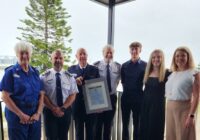In Stephen Covey’s book The 7 Habits of Highly Effective People, there’s a powerful anecdote about love as an action rather than a feeling. Covey tells the story of a man who felt stuck in a loveless marriage. The man didn’t know what to do, but Covey’s advice was straightforward: to love her anyway. The idea that love is a verb — something we choose to do — resonated with me from the first time I read it some twenty years ago. It’s not just about relationships; it’s about everything we care deeply about.
Fishing is no different. The more I invest in it — not just by wetting a line but by actively protecting and nurturing the sport — the more I get out of it. This philosophy has shaped my approach to fishing and conservation, leading me to jump at the chance to join the Great Aussie Crab Pot Review (an initiative of OzFish Unlimited and OceanEarth Foundation). I’d be telling a furphy if I suggested that there was no fishing motivation… of course there was! I’d never been to Karumba and had heard so much about the fabulous fishing on offer, I was champing at the bitt!
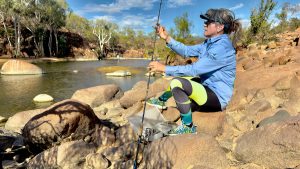
A river somewhere: this tributary of the Einasleigh River near Mt Surprise looked prime for sooty grunter. Many were spotted. None were caught.
The Phantom Menace: Ghost Gear
Ghost gear — the term used for lost or discarded fishing equipment — haunts our oceans and rivers. It’s the silent killer, lurking beneath the waves, ensnaring fish, turtles, birds, and even larger species like sharks and crocodiles. The Gulf of Carpentaria, with its vast and pristine waters, is not immune to this scourge. The Great Aussie Crab Pot Review set out to tackle this problem head-on, gathering insights from recreational fishers, organising clean-up events, and recycling the retrieved gear.
When the call to nominate as a volunteer for the project was published, I didn’t hesitate. The opportunity to blend my love of fishing with conservation work — and to do it in new, unexplored waters — was irresistible. Being a teenager in the ‘80’s I thought it’d be cool to go “Ghostbusting”.
Growing up on the Top End coast, crab pots were a common sight. I assumed everyone retrieved their pots. Why wouldn’t they? It never occurred to me that strong tides, storms, or even thieves might prevent their recovery. But seeing the damage that forgotten pots can cause was an uncomfortable awakening.
I knew about the horrible outcomes for platypus, turtles and the like when they encounter opera house-style yabby nets in our freshwater systems (leading to a recent ban across Australia), but my brain hadn’t extrapolated that out to all types of abandoned gear. Is this sort of blinkered thinking a symptom of wilful blindness? Am I the only passionate fisho who doesn’t follow the proverbial tethered nylon rope from the branch to the forgotten pot beneath the waves? I’m thinking not. And I’m feeling ignorant and more than a tad ashamed.
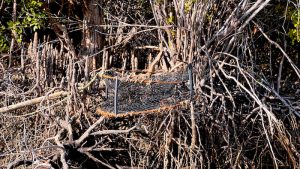
A ghost pot lodged in mangrove roots, retrieved when the tide allowed.
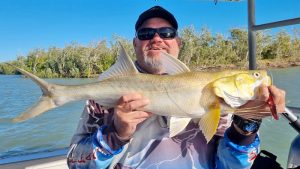
Mark Harris vibed up this lovely threadfin salmon during one of our fishing sessions.
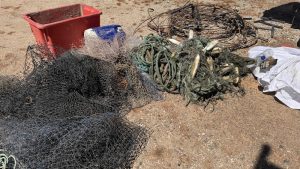
Some of the retrieved ghost gear, dismantled, sorted and ready for recycling.
I’m a changed woman
I’ll never forget the satisfaction of hauling in ghost gear. Every retrieved pot felt like a small victory — many critters saved; a habitat relieved. The camaraderie among our team made the work feel less like a chore and more like a shared adventure. In fact, we had an absolute ball!
Some gear we recovered had been lost and dastardly for a long time, making the job tough. In some cases, mangroves had started to claim the ropes with their growth. Knives, gaffs, landing nets and grapples were all employed by our team, who often hung upside down out of the Kerry D, with others of us holding legs and ankles to ensure they didn’t fall overboard!
Those efforts were epic, often lasting half hour or so and exhausting the crew on the tools… but every retrieval was met with whoops and hollers, fist pumps and big shit-eating grins. It’s highly rewarding work!
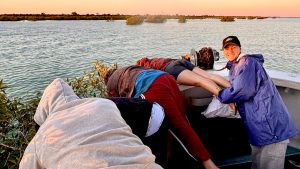
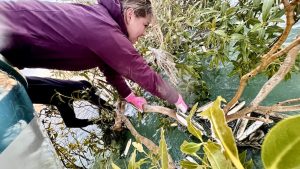
Team members spent half an hour or so retrieving this long-lost squid net, requiring support and teamwork from all hands.
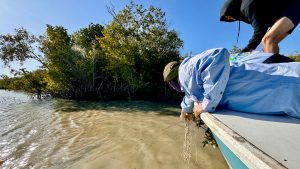
Kerry D reverses in an attempt to dislodge a silted over, submerged crab pot. The attached rope was discovered tied to a mangrove, but only the frame of the pot was successfully retrieved in this case.
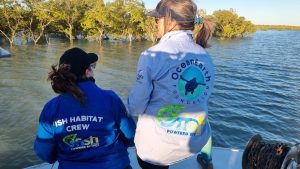
Jo Starling and Laurinda George prepare to retrieve a pot.
Reflecting on the Experience
Participating in the Great Aussie Crab Pot Review has been a journey of reflection as much as action. As we fished for golden snapper and wrangled queenfish in shallow waters, the importance of our mission was ever-present. How many of those same waters had been compromised by ghost gear? The thrill of reeling in a metre-plus mulloway (didn’t happen for us, but did for a land-based tourist), or watching a fellow angler land a quality threadie, was tempered by the thought of what might be lurking beneath — abandoned nets and traps, silently continuing their deadly work.
Responsible fishing is one of those things that doesn’t make the press. No-one shares the story about witnessing a fisho taking their fishing gear, litter, etc. home with them, or driving away from a spawning aggregation of fish, or releasing undersized fish, even though these ethics are increasingly commonplace in our tribe — thank goodness!
Conversely, irresponsible fishing is a hot topic that media just loves to highlight. Of course, this is the remit of all stakeholders, not just us rec’s. We are still suffering the diabolical outcome of the SA snapper fishery collapse, which I recall being forecast by rec’ fishing charter operators a decade or more before it happened… bemoaning that the government weren’t heeding their warnings because the commercial sector was too powerful.
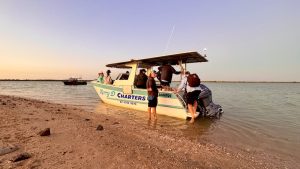
The Great Aussie Crab Pot Review team board Kerry D as the sun rises over the Norman River in the Gulf of Carpentaria.
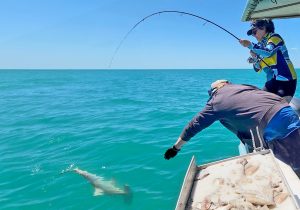
Sean the decky prepares to grab Jo’s leader after a torrid waltz around the Kerry D. Hammerhead successfully released unharmed.
With that in mind, I was devastated to learn of a similar collapse in Karumba! Famous for its hard-fighting, trophy-sized javelin fish, I was keen to learn the best time of year to return for some of that action. I was catching 20-25cm models hand over fist (turns out they prefer Fish Bites to bait!). Even at this size, they pull really hard, so I was frothing at the thought of the reputed 90cm specimens!
I asked our skipper, a retired local commercial crabber who’d been around longer than many of the mangroves. “Ten years ago” came his dry answer. Overfishing of spawning aggregations decimated the population. Now, instead of 60-90 cm bruisers, the year class is basically those I was catching. I did hear of a 60cm one being caught whilst we were there… and the fact that the smaller ones are commonplace suggest a spawning population still exists somewhere, thankfully. It’s just not in the Norman River anymore.
Ghost gear plays a similarly devastating role, continuing to fish and crab autonomously and indiscriminately on our human behalf.
Fishing should be about those moments of pure joy — the heart-stopping runs of a big queenie across the flats, the surprising power of a mega pikey bream like the ones I enjoyed catching in Karumba during my stay, or the exhilaration of a hard-fighting 60cm blue salmon taking off like a freight train. But it’s up to us to ensure that future generations have the same opportunities.
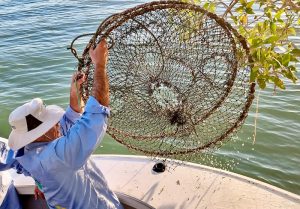
Denzil Brunner heaves a ghost pot out of the Norman River.
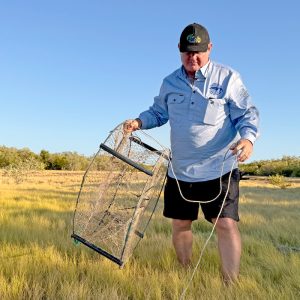
Robbie Porter from OzFish Unlimited retrieves an abandoned pot found high and dry on a floodplain.
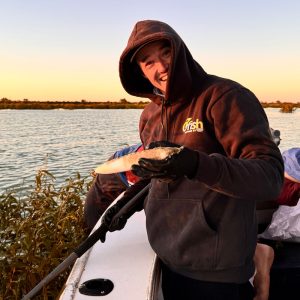
Lucas Kas, Project Coordinator with OzFish Unlimited, celebrates a float coming aboard… the rest of the squid net is still wrapped in the mangroves. This one was a particularly challenging retrieval that involved many hands!
Good Vibes
There’s something undeniably uplifting about contributing to habitat restoration. It’s addictive, like the rush of landing a fish after along fight. The Great Aussie Crab Pot Review provided a next-level dose of those endorphins, amplified by the knowledge that our efforts would have lasting impacts. Imagine the satisfaction of knowing that the nets we retrieved will be recycled into new pot floats, keeping the cycle of conservation going.
I hope you feel inspired to reflect on your own fishing experiences and consider how you can actively love the sport — because it needs your love. Whether it’s joining OzFish Unlimited, participating in clean-ups, or simply being more mindful on the water, there’s always something you can do.
My adventure with the Great Aussie Crab Pot Review has deepened my commitment to environmental stewardship and reminded me that love — whether for a person, a sport, or a planet — is an action… a verb. How great would it be if all of us who so often declare “I absolutely LOVE fishing” were talking about our personal ethos, not just a passion? Imagine the impact on our social license 😉
Until next time… FISH ON!

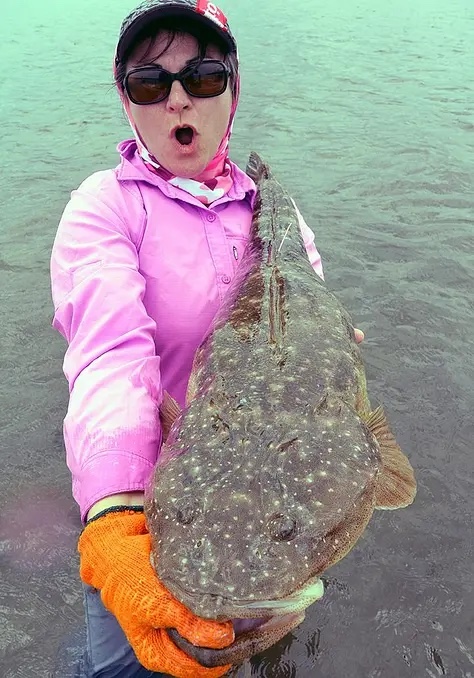
For three decades Jo has worked with businesses and personalities, helping them to promote themselves in one form or another, whether through graphic design, advertising, promotions or marketing.
She has owned a fishing rod for just as long, but it’s only been in this new century that it hasn’t been allowed to gather dust.
Jo is a passionate advocate for the sport of fishing and its promotion as a healthy lifestyle for women.
To find out more about Jo visit her website HERE
Or you can visit her Fishtopia Web site HERE or on the banner below.
Jo is also the founder and National President of the Women’s Recreational Fishing League (WRFL) Inc. The work they do is very important in balancing the participation ratios of fishing in Australia, thus making the collective voices of Aussie anglers more harmonious and powerful, as well as shoring up the economy of the sector. For more information visit their Website at womensrecfishingleague.org








